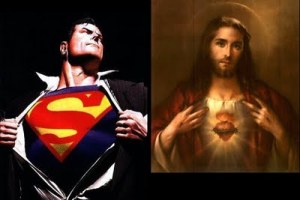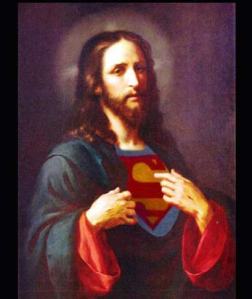Who was the historical Jesus? Recent studies have razored the verifiable facts down to a skeleton so thin I made the mistake of suggesting at a dinner party that there’s not enough evidence to assume a real Jesus ever existed. Isn’t it just a question of faith?
This did not make me popular with the religion professor across the table. She cited the usual witnesses, Josephus, Tactus, Pliny, all nice guys but a bit flimsy on cross-examination. It’s tricky when you see just how many Christs (it’s not a name but a title, “the messiah”) were wandering Roman-occupied Israel during the first century. Add the even longer tradition of pagan godmen born of virgins who die for us and are reborn, and Jesus may be the most rebooted superhero in history.
But if Jesus wasn’t the first self-sacrificing demigod to save the world, he’s by far the most influential. It doesn’t take a biblical scholar to recognize other family resemblances: a Jew found by Egyptians, a Kryptonian by humans; a human reared by apes, fairies, or elves, a wizard by muggles, a king by backwater nobles, the son of God by Jews. The boy is always fated to grow up extraordinary: prophet, Man of Steel, jungle lord, Santa Claus, Voldemort-slayer, King of England, God. Movie directors also love to shoot their spandex godmen in crucifix-evoking poses, Superman especially (Smallville, Superman Returns, Man of Steel), and a Last Temptation motif runs through the screen genre too (Superman II, Spider-Man 2, The Fantastic Four, The Dark Knight Rises, The Wolverine).
There’s enough written on the historical Jesus to crash a Kindle, but the New and Improved Testament of Superman would be simpler. Did a historical Clark Kent ever walk the Earth? Interpretations fall into three camps:
1) Literalists accept the claims of the canonical Media as absolute: Clark was an extraterrestrial with supernatural powers dedicated to humankind.
2) Historicists analyze both canonical and non-canonical Media in search of the so-called authentic Clark, a human being of purely naturalistic ability around whom followers later developed legendary tales.
3) Mythicists reject that any Clark, human or extraterrestrial, existed, arguing that early Superman worship was actually an adaptation of pre-existing practices common to the era.
Literalism dominates popular culture. A 2012 Rasmussen poll found that 86% of Americans believe Clark Kent walked among us, and 77% believe he was resurrected after his battle with Doomsday. While vaguely aware of the academic controversies surrounding the historical Clark, the average comic book reader would never question Superman’s extraterrestrial origins and powers. Literalists prefer the traditional assumption that Superman Media were created through infallible inspiration and that dissecting long-cherished productions is an offense to followers. But no belief system, no matter how deeply ingrained in a cultural psyche, is exempt from intellectual examination. Believers should be willing to combine the faith of their convictions with the rigor of impartial analysis.
Looking first at canonical Media, both Historicists and Mythicists make much of the fact that Superman Adventures contain a lot of internal contradictions. Was, for instance, the infant Clark ever placed in an orphanage? The Adventures According to Max show that he was, but Adventures According to George include no orphanage and depict only the Kent foster parents finding and raising the Superman child. Max never even mentions the Kents. Some Literalists explain the inconsistency by citing Jerome & Joe, arguably the oldest of the Media, when the Kents deliver the foundling to an orphanage and then return to adopt him. Reliance on Jerome & Joe, however, points out other contradictions. Superman’s adoptive mother—Martha in the other Media and in most Literalist ceremonies—is Mary here.
The Media is also inconsistent regarding superpowers. Although tradition maintains that Superman always had the ability to fly, Jerome & Joe list no such power, and Clark’s propensity to “hurdle skyscrapers” and “leap an eighth of a mile”—from the earliest version of the Superman creed still repeated by followers today—implies the opposite. The creed itself has undergone multiple changes, and even DC Entertainment, that bastion of superhero fundamentalism, acknowledges that the addition of “and the American way” to Superman’s pledge to fight for “truth and justice” is an interpolation into George, as demonstrated by the phrase’s absence in the otherwise identical Max edition (Max is assumed to be older because later media tend to expand rather than condense earlier sources).
A study of non-canonical Media, or Apocrypha, raises further issues. While The Lost Episodes of Psuedomax can be dismissed, more has been made of the largely forgotten Adventures According to Christopher. The assertion that George and Christopher are the same creator (based mostly on the misreading of “Reeve[s]” as a surname rather than a title) is rejected by most scholars, but the video still challenges many elements of the tradition. Literalists cite it as an independent source supporting the general narrative of the canonical Adventures, but the Christopher depiction of Krypton varies radically with George and lends support to the growing consensus that all accounts of Superman’s planet of origin are conjectural.
Despite annual re-enactments of the baby Superman’s escape from doomed Krypton in his father’s rocket and the tearful farewell of his self-sacrificing biological parents, there’s little support for the tale’s authenticity. Only George in the Superman Media dramatizes it. Jerome & Joe and Max mention only the fact of the planet’s destruction and the arrival of the rocket on earth. Not only may Superman’s biological parents be inventions, but even the name of the planet is suspect (Krypton, or “Crypt-on,” translates “on or from the unknown”).
The most famous Apocrypha are the much maligned Infancy Adventures. These psuedographics, many attributed to the heretical Super Friends cult, feature a pre-adolescent Clark, or “Superboy,” engaging in acts clearly derivative of the canonical Adventures. Literalist tradition maintains that Clark Kent’s powers manifested with puberty. The Infancy Apocrypha pose no direct threat to Literalism, or even Historicism, but Mythicists use the tales to highlight temporal gaps in the biography. Neither Literalists nor Historicists can say much about Clark until the age of thirty when he dons his ceremonial costume and his followers dub him Superman (a title, Literalist point out, Clark never claimed for himself). It’s hardly surprising no records remain of Clark before the age twelve, but the dearth of information after the initial development of his powers and before his dedication to humankind is odd. It doesn’t, however, lead to the Mythicist conclusion that no historical Clark ever existed.
Mythicists also point to elements in the Superman Media that pre-date the composition of the earliest Adventures and so, they argue, disprove a historical basis for Clark Kent. They trace the name “Superman” to an obscure, German prophet and say the Clark/Superman duality is prefigured by the cult of The Scarlet Pimpernel. Mythicists also spend a great deal of time analyzing pre-Superman superhero prototypes in attempt to show that all portrayals of battles between good and evil must be fictional. Many Mythicists view the Superman Media as allegories showing how to realize you “inner Superman” by destroying your “home planet”(the lowly physical world ) and dedicating yourself to “truth and liberty.” Krytonite represents material distractions that prevent initiates from maintaining their spiritual powers.
Although the Mythicist approach is easy to lampoon, a purely Literalist approach is equally problematic. Historicists may unjustifiably dismiss the extraterrestrial nature of Clark Kent, but their scholarship can peel away inauthentic elements from the historical Adventures to reveal the true Superman. Followers owe it to the memory of Clark Kent to bring Superman worship into the 21st century. How can we dismiss other religion’s superstitious beliefs—with their magic cosmic rays and radioactive spiders bites—without fully examining our own?


Fantastic as always, Chris. I am starting to envy you.
Many thanks, Osvaldo.